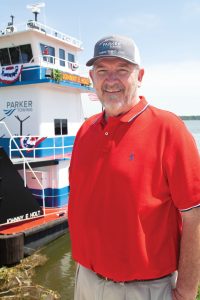PTC’s Johnny Holt Offers In-Depth Look At Port Engineer Role

Johnny Holt was already a painter and a welder in 1988 when he began decking for Tuscaloosa, Ala.-based Parker Towing Company at the suggestion of his father-in-law, Capt. Bill Archie, who worked for the company. His aptitude for mechanical work and engines was noticed, and made him a “deckineer.” He moved full time into the shop as a welder in 1989, moved into the engineering department in 1996 and was later promoted to senior port engineer. He now has spent 37 years at Parker Towing Company and shows no signs of slowing down.
As a port engineer, Holt has worked on all the engines of Parker’s fleet at one time or another, whether swapping them out in drydock, doing routine maintenance or upgrading them.
Looking from the outside in, many people might think that, because the position of port engineer is a shore job with supposedly regular hours, not a watchstanding boat job, port engineers get to spend more time at home. That’s not necessarily the case, though.
“When you’re a port engineer, you’re on call 24/7,” Holt told The Waterways Journal. “The phone never stops ringing.”
He also spends quite a bit of time on the road, traveling around to different fleet or drydock locations, whether in Paducah, Ky., or Northport, Ala., and anywhere in between.
Engineers don’t just take care of engines. They also look after all the other equipment on a boat, including pumps, generators, bilge pumps, shaft seals and everything else.
The Coast Guard requires all boats of more than 3,000 hp. to have a full-time engineer. Holt thinks automation has gone as far as it can go in the engineroom. There will always be a need for a responsible person in the engineroom or on shore, he said.
“On some boats, there’s one engineer, and he can go to sleep, but there are cameras and monitors in there that the captain can keep track of,” Holt said. “But there’s an alarm in the engineer’s bedroom, so he can be on call at a moment’s notice.”
Parker Towing Company has six port engineers in total, and two of them are young guys in their 30s. Mentorship is an important part of what the older engineers like Holt do. Engineers—whether in the shop or on a boat—have to be lifelong learners, Holt said. He has seen the changeover from mechanical to digital electronic controls, as well as the arrival of Subchapter M and numerous upgrades and tweaks to engines and other systems.
“Heck, I’m still learning,” Holt said.
That’s one thing that keeps him engaged and loving his work. Another thing is the support he gets from his employer.
“Parker will do everything they can to help you grow,” he said. “It’s a great-paying job, and a good life if you’re not afraid of hard work.”
Holt’s dedication was recognized when Parker Towing Company christened the mv. Johnny E. Holt in just last year.


